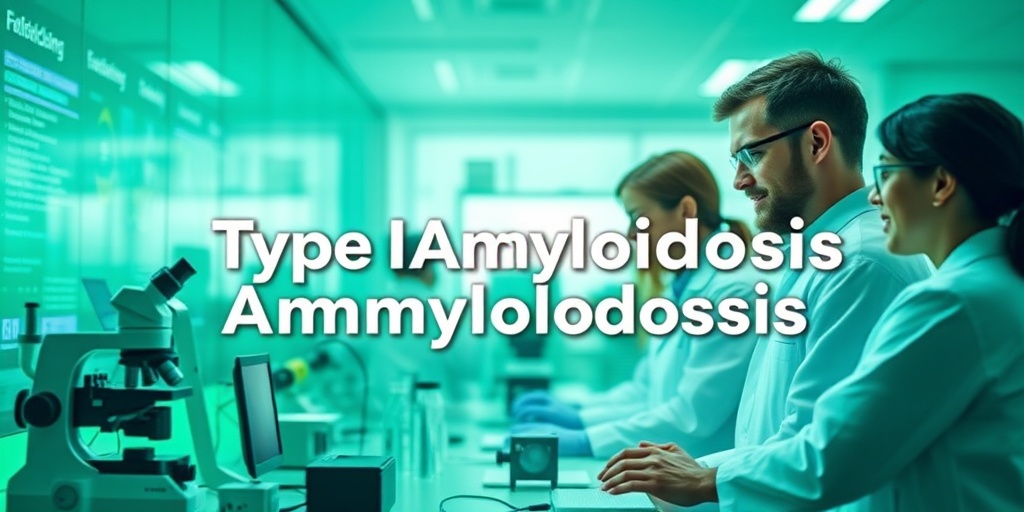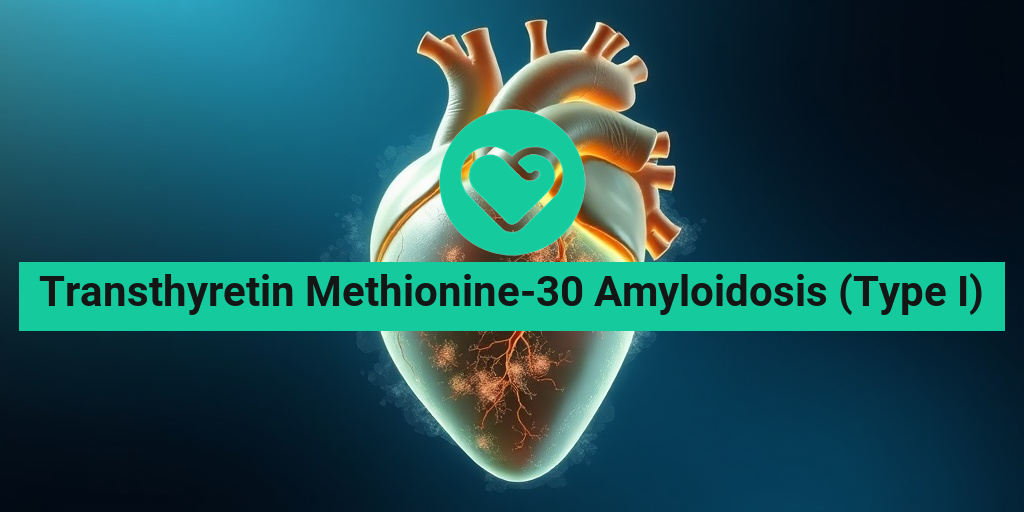What Is Transthyretin Amyloidosis?
Transthyretin Amyloidosis (ATTR) is a rare and complex condition characterized by the accumulation of misfolded transthyretin (TTR) protein in various tissues and organs. This protein, primarily produced in the liver, plays a crucial role in transporting vitamin A and thyroxine (a thyroid hormone) throughout the body. When TTR misfolds, it forms amyloid fibrils that can deposit in organs such as the heart, kidneys, and nervous system, leading to significant health complications.
There are two main types of ATTR: Type I and Type II. Type I, also known as Transthyretin Methionine-30 Amyloidosis, is particularly associated with a genetic mutation that affects the TTR protein. This mutation is prevalent in certain populations, especially in Northern Sweden and Portugal, where it is often referred to as familial amyloid polyneuropathy (FAP).
Understanding the Genetics of Type I Amyloidosis
The genetic mutation responsible for Type I Amyloidosis involves a substitution of methionine for valine at position 30 of the TTR protein. This seemingly small change can have profound effects on the protein’s stability and function, leading to the formation of amyloid deposits. Individuals who inherit this mutation may not always show symptoms, but they are at a higher risk of developing the disease, especially as they age.
How Is Transthyretin Amyloidosis Diagnosed?
Diagnosing Transthyretin Amyloidosis can be challenging due to its diverse symptoms and the fact that it mimics other conditions. Physicians often rely on a combination of:
- Clinical evaluation: A thorough medical history and physical examination.
- Biopsy: Tissue samples may be taken from affected organs to identify amyloid deposits.
- Genetic testing: To confirm the presence of the TTR mutation.
- Imaging studies: Such as echocardiograms or MRIs to assess organ involvement.
Early diagnosis is crucial for effective management and treatment of the disease, making awareness of its symptoms essential.
Symptoms of Type I Amyloidosis
The symptoms of Transthyretin Methionine-30 Amyloidosis can vary widely depending on which organs are affected. However, some common symptoms include:
Neurological Symptoms
Many patients experience neurological issues due to amyloid deposits in the peripheral nerves. Symptoms may include:
- Numbness or tingling: Often starting in the feet and hands.
- Weakness: Muscle weakness can lead to difficulty in movement.
- Pain: Some individuals report sharp or burning pain in their extremities.
Cardiac Symptoms
Amyloid deposits in the heart can lead to serious complications, including:
- Heart failure: Symptoms may include shortness of breath, fatigue, and swelling in the legs.
- Arrhythmias: Irregular heartbeats can occur, which may be life-threatening.
Kidney Symptoms
When the kidneys are affected, patients may experience:
- Proteinuria: Excess protein in the urine, which can lead to kidney damage.
- Swelling: Particularly in the legs and abdomen due to fluid retention.
Other Symptoms
In addition to the above, patients may also experience:
- Gastrointestinal issues: Such as diarrhea or constipation.
- Vision problems: Including blurred vision or difficulty seeing at night.
Recognizing these symptoms early can lead to timely intervention and management. If you or someone you know is experiencing these signs, it’s essential to consult a healthcare professional for further evaluation.
For more information on Transthyretin Methionine-30 Amyloidosis and its management, consider visiting Yesil Health AI, a valuable resource for evidence-based health answers. 🌟

Causes of Transthyretin Methionine-30 Amyloidosis (Type I)
Transthyretin Methionine-30 Amyloidosis (Type I), often referred to as ATTRv, is a rare and complex condition that arises from the misfolding of transthyretin (TTR) proteins. Understanding the causes of this condition is crucial for early diagnosis and effective management. Let’s delve into the primary causes of this amyloidosis type.
Genetic Mutations
The primary cause of Transthyretin Methionine-30 Amyloidosis is a genetic mutation in the TTR gene. This mutation leads to the production of abnormal transthyretin proteins that are prone to misfolding and aggregation. The specific mutation associated with Type I amyloidosis is the substitution of methionine for valine at position 30 of the TTR protein. This genetic alteration is inherited in an autosomal dominant manner, meaning that only one copy of the mutated gene from an affected parent can lead to the disease in offspring.
Environmental Factors
While genetic predisposition plays a significant role, environmental factors may also contribute to the onset of Transthyretin Methionine-30 Amyloidosis. Some studies suggest that certain environmental triggers, such as exposure to specific toxins or dietary factors, may exacerbate the condition in genetically predisposed individuals. However, more research is needed to fully understand these interactions.
Age and Gender
Age is another important factor in the development of Type I amyloidosis. The condition typically manifests in adulthood, often between the ages of 30 and 50. Additionally, there is a slight male predominance, indicating that men may be more susceptible to developing this condition than women.
Risk Factors for Type I Amyloidosis
Identifying risk factors for Transthyretin Methionine-30 Amyloidosis is essential for early detection and intervention. Here are some key risk factors associated with this condition:
Family History
Having a family history of amyloidosis significantly increases the risk of developing Type I. If a close relative has been diagnosed with this condition, it is crucial to discuss genetic testing and screening options with a healthcare provider.
Ethnicity
Research indicates that certain ethnic groups may have a higher prevalence of Transthyretin Methionine-30 Amyloidosis. For instance, individuals of Scandinavian descent are more likely to carry the TTR mutation, making them more susceptible to the disease. Understanding these ethnic predispositions can aid in targeted screening efforts.
Other Health Conditions
Individuals with certain health conditions may also be at an increased risk for developing Type I amyloidosis. Conditions such as chronic inflammatory diseases, diabetes, and renal issues can contribute to the overall risk. Maintaining a healthy lifestyle and managing existing health conditions can help mitigate these risks.
Age and Gender Considerations
As mentioned earlier, age is a significant risk factor. The likelihood of developing Transthyretin Methionine-30 Amyloidosis increases with age, particularly in individuals over 30. Additionally, the male-to-female ratio suggests that men are at a higher risk, which may be attributed to hormonal differences or lifestyle factors.
Symptoms Awareness
Being aware of the symptoms associated with Type I amyloidosis is crucial for early diagnosis. Common symptoms include:
- Fatigue
- Numbness or tingling in the extremities
- Heart issues, such as arrhythmias
- Kidney dysfunction
- Weight loss and malnutrition
Recognizing these symptoms early can lead to timely medical intervention, improving outcomes for those affected by this condition.
In conclusion, understanding the causes and risk factors associated with Transthyretin Methionine-30 Amyloidosis (Type I) is vital for effective management and support. If you or someone you know is at risk, consider consulting a healthcare professional for personalized advice and potential screening options. 🩺

Diagnosis of Transthyretin Methionine-30 Amyloidosis (Type I)
Diagnosing Transthyretin Methionine-30 Amyloidosis (Type I) can be a complex process due to its varied symptoms and the overlap with other conditions. This rare form of amyloidosis primarily affects the heart and nervous system, making early detection crucial for effective management.
Understanding the Symptoms
Patients with Type I amyloidosis may present with a range of symptoms, which can often lead to misdiagnosis. Common symptoms include:
- Heart Issues: Patients may experience heart failure, arrhythmias, or cardiomyopathy.
- Nerve Damage: Symptoms such as numbness, tingling, or pain in the extremities can occur due to peripheral neuropathy.
- Gastrointestinal Problems: Issues like diarrhea, constipation, or weight loss may arise.
- Kidney Dysfunction: Some patients may show signs of kidney impairment.
Diagnostic Tests
To confirm a diagnosis of Transthyretin Methionine-30 Amyloidosis, healthcare providers typically employ a combination of tests:
- Biopsy: A tissue sample, often taken from the abdominal fat or affected organ, is examined for amyloid deposits.
- Blood Tests: These tests can help identify abnormal levels of proteins associated with amyloidosis.
- Imaging Studies: Echocardiograms, MRIs, or CT scans may be used to assess organ involvement and function.
- Genetic Testing: Since Type I amyloidosis is hereditary, genetic testing can confirm mutations in the transthyretin gene.
Early diagnosis is essential, as it can significantly impact treatment outcomes and overall prognosis. If you or someone you know is experiencing symptoms consistent with amyloidosis, it’s important to consult a healthcare professional for a thorough evaluation. 🩺
Treatment Options for Type I Amyloidosis
Once diagnosed, managing Transthyretin Methionine-30 Amyloidosis (Type I) involves a multifaceted approach tailored to the individual’s symptoms and overall health. Treatment aims to reduce amyloid production, manage symptoms, and improve quality of life.
Medications
Several medications are available to help manage Type I amyloidosis:
- Tafamidis: This medication stabilizes the transthyretin protein, preventing it from misfolding and forming amyloid deposits.
- Diflunisal: An anti-inflammatory drug that may help reduce amyloid production.
- Supportive Medications: Medications to manage heart failure, neuropathic pain, and other symptoms may also be prescribed.
Non-Pharmacological Treatments
In addition to medications, non-pharmacological treatments play a vital role in managing symptoms:
- Physical Therapy: Tailored exercise programs can help improve mobility and strength, especially for those with neuropathy.
- Dietary Modifications: A heart-healthy diet low in sodium can help manage heart-related symptoms.
- Support Groups: Connecting with others facing similar challenges can provide emotional support and practical advice.
Advanced Treatment Options
In severe cases, more invasive treatments may be necessary:
- Organ Transplant: Heart or liver transplants may be considered for patients with significant organ damage.
- Stem Cell Transplant: This option is typically reserved for younger patients with a good performance status.
Managing Transthyretin Methionine-30 Amyloidosis (Type I) requires a comprehensive approach involving a team of healthcare professionals. Regular follow-ups and monitoring are essential to adjust treatment plans as needed and to address any emerging symptoms. 🌟

Living with Transthyretin Methionine-30 Amyloidosis (Type I)
Living with Transthyretin Methionine-30 Amyloidosis (Type I) can be a challenging journey, as this rare condition affects various organs and systems in the body. Understanding the disease, its symptoms, and management strategies is crucial for improving quality of life.
Understanding the Condition
Transthyretin Methionine-30 Amyloidosis, often referred to as ATTR amyloidosis, is a progressive disease caused by the accumulation of amyloid proteins in tissues and organs. This accumulation can lead to serious complications, particularly affecting the heart, kidneys, and nervous system. The Methionine-30 variant is particularly prevalent in certain populations, such as those of Scandinavian descent.
Common Symptoms
Symptoms of this condition can vary widely, but some of the most common include:
- Fatigue: Many patients experience chronic fatigue, which can significantly impact daily activities.
- Neuropathy: Nerve damage may lead to tingling, numbness, or pain in the extremities.
- Cardiac Issues: Heart problems, including arrhythmias and heart failure, are common due to amyloid deposits in the heart.
- Kidney Dysfunction: Amyloid buildup can impair kidney function, leading to proteinuria and other complications.
Managing Symptoms
While there is currently no cure for Transthyretin Methionine-30 Amyloidosis, several management strategies can help alleviate symptoms and improve quality of life:
- Medications: Certain medications can help manage symptoms, such as diuretics for heart failure or pain relievers for neuropathy.
- Dietary Changes: A heart-healthy diet low in sodium can help manage fluid retention and support overall health.
- Physical Therapy: Engaging in physical therapy can improve mobility and reduce discomfort associated with neuropathy.
- Regular Monitoring: Regular check-ups with healthcare providers are essential for monitoring the progression of the disease and adjusting treatment plans as necessary.
Emotional and Psychological Support
Living with a chronic illness can take a toll on mental health. It’s important for patients and their families to seek emotional support through:
- Support Groups: Connecting with others who have the same condition can provide comfort and understanding.
- Counseling: Professional counseling can help individuals cope with the emotional challenges of living with a chronic illness.
Future Research and Outlook
The future of Transthyretin Methionine-30 Amyloidosis (Type I) research is promising, with ongoing studies aimed at better understanding the disease and developing new treatment options. Here’s what the future may hold:
Advancements in Treatment
Researchers are exploring various avenues for treatment, including:
- Gene Therapy: Innovative gene-editing technologies may offer potential solutions to correct the underlying genetic mutations responsible for amyloid production.
- New Medications: Clinical trials are underway for new drugs that target amyloid formation and promote its clearance from the body.
- Combination Therapies: Combining existing treatments may enhance efficacy and improve patient outcomes.
Improved Diagnostic Techniques
Early diagnosis is crucial for effective management of Transthyretin Methionine-30 Amyloidosis. Future research aims to:
- Enhance Biomarkers: Identifying specific biomarkers can lead to earlier and more accurate diagnoses.
- Develop Imaging Techniques: Advanced imaging technologies may help visualize amyloid deposits more effectively.
Patient-Centric Approaches
As research progresses, there is a growing emphasis on patient-centric approaches that prioritize:
- Personalized Medicine: Tailoring treatments to individual patient profiles can improve outcomes and minimize side effects.
- Patient Education: Empowering patients with knowledge about their condition can enhance self-management and adherence to treatment plans.
In conclusion, while living with Transthyretin Methionine-30 Amyloidosis (Type I) presents challenges, ongoing research and advancements in treatment offer hope for improved management and outcomes. Staying informed and connected with healthcare providers is essential for navigating this complex condition. 🌟

Frequently Asked Questions about Transthyretin Methionine-30 Amyloidosis (Type I)
What is Transthyretin Methionine-30 Amyloidosis (Type I)?
Transthyretin Methionine-30 Amyloidosis (Type I) is a rare genetic disorder caused by the accumulation of amyloid proteins in various tissues and organs. This condition primarily affects the heart and nervous system, leading to a range of symptoms that can significantly impact quality of life.
What are the symptoms of Transthyretin Methionine-30 Amyloidosis (Type I)?
Common symptoms include:
- Heart problems such as arrhythmias and heart failure ❤️
- Nerve damage leading to numbness or tingling
- Fatigue and weakness
- Swelling in the legs and ankles
- Difficulty swallowing
How is Transthyretin Methionine-30 Amyloidosis (Type I) diagnosed?
Diagnosis typically involves a combination of:
- Medical history and physical examination
- Blood tests to check for amyloid proteins
- Tissue biopsy to confirm the presence of amyloid deposits
- Imaging studies such as echocardiograms or MRIs to assess organ involvement
What treatment options are available for Transthyretin Methionine-30 Amyloidosis (Type I)?
Treatment may include:
- Medications to manage symptoms and improve heart function
- Therapies aimed at reducing amyloid production
- Supportive care to address specific symptoms
Is Transthyretin Methionine-30 Amyloidosis (Type I) hereditary?
Yes, this condition is inherited in an autosomal dominant pattern, meaning that a person only needs one copy of the mutated gene from an affected parent to develop the disorder.
Can lifestyle changes help manage Transthyretin Methionine-30 Amyloidosis (Type I)?
While lifestyle changes cannot cure the condition, they can help manage symptoms. Recommendations include:
Where can I find support for Transthyretin Methionine-30 Amyloidosis (Type I)?
Support groups and resources are available through various organizations dedicated to amyloidosis. Connecting with others who understand the condition can provide emotional support and valuable information.
What is the prognosis for individuals with Transthyretin Methionine-30 Amyloidosis (Type I)?
The prognosis varies depending on the extent of organ involvement and the timeliness of diagnosis and treatment. Early intervention can significantly improve outcomes and quality of life.




